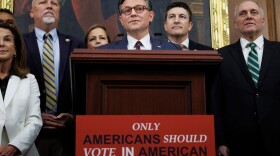Recent shootings on college campuses in Arizona and Oregon have brought the issue of gun control back to the national consciousness, and Martin O'Malley is angry.
In Tuesday's debate, the former governor of Maryland O'Malley talked about how he passed comprehensive gun control in his state. Before a crowd at the College of Southern Nevada Wednesday, he expressed anger and disbelief the nation hasn't followed suit.
"I refuse to believe that we are so numb as a people that we can't do something about this," he said. "I mean, think what we did as a nation when one guy had a failed shoe bomb attempt and ever since, for years and years, we've been taking off our shoes and standing in lines at the airport. And yet, we have mass shooting after mass shooting after mass shooting, and we shrug our shoulders like we're a bunch of passive lambs to the slaughter, that we can't do anything about this. We can do something about this. We must do something about this."
O'Malley acknowledged that his platform didn't exactly make him popular among gun owners and hunters in Maryland. But, he stressed that, through dialogue and communication, they were more or less able to accept his proposals on gun control. He suggested the same kind of tactic could work on a national level.
"The best way to work on Congress right now is to talk about this in a national context of a national campaign, and to strive for that deeper understanding that yes, we can protect hunting traditions, but also protect American lives at the same time," he said.
O'Malley wants to tackle gun regulation with a five-pronged approach. He wants to mandate universal background checks, ban combat assault weapons, improve safety technology in weapons, make weapons trafficking a federal felony, and repeal PLCAA.
PLCAA is the acronym for the Protection of Lawful Commerce in Arms Act. That's a law passed in 2005 that indemnifies gun manufacturers and dealers from any civil action related to their products. In other words, if someone shoots you with a gun, you can't sue the gun manufacturer for damages because their product hurt you.
The repeal of PLCAA has been a cause for Sandy and Lonnie Phillips. They joined O'Malley at the debate Tuesday, and spoke at his event Wednesday.
Their daughter, Jessie, was killed in the 2012 shooting at a movie theater in Aurora, Colorado. They took the company to court who sold convicted shooter James Holmes ammunition. The Phillips' case was dismissed under PLCAA, and it has caused difficulties for the family as a result.
"Well, what happened when we filed the lawsuit was that we knew we were going to be a hard sell," Lonnie said. "What we didn't know fully was that Colorado had passed law 2008 that says if your case is dismissed in federal court, you have to pay the attorneys fees for the opposing side."
Those fees were more than a quarter million dollars. They've since been reduced to just over $200,000, but the Phillips say they have no intention to pay.
They see the provisions in PLCAA as a way to inhibit any kind of real discussion about gun control. The Phillips identify as single-issue voters, and given O'Malley's stance on repealing PLCAA, they plan to vote for him.










